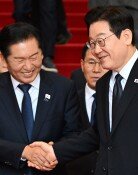Asahi Shimbun: ‘Japan should revive S. Korea-Japan relations’
Asahi Shimbun: ‘Japan should revive S. Korea-Japan relations’
Posted February. 03, 2022 07:46,
Updated February. 03, 2022 07:46
The Japanese government on Tuesday submitted applications for listing of its gold and silver mines on the island of Sado for consideration as world heritage sites by UNESCO. The result will come out in June or July next year.
NHK reported that the Japanese government decided to move forward with its bid to nominate mines on Sado Island as a UNESCO world heritage site at the Cabinet meeting held on Tuesday. The Nikkei carried an article on Wednesday that Japan expects two-thirds of 21 member nations on the World Heritage Committee would approve. The listing of UNESCO world heritage sites is ordinarily decided upon a unanimous decision of the member nations, but the Japanese government considers that such unanimous decision is unlikely because of the South Korean government’s opposing bid. The Ministry of Foreign Affairs and the Ministry of Education, Culture, Sports, Science and Technology of Japan organized a task force for nomination of mines on Sado Island as a UNESCO world heritage site and held the first meeting on Tuesday. The South Korean had also launched a public-private task force to respond to Japan’s attempt to recast history.
Several Japanese media outlets have raised criticisms. The Asahi Shimbun carried an editorial entitled “Japan must face facts to win bid for Sado mines heritage listing,” where it wrote that reviving neighborhood diplomacy comes before fighting at UNESCO. “Every World Heritage site has a complex history and gets mixed appraisals,” the editorial further read. “The attitude Japan needs to maintain is to humbly acknowledge the negatives and strive for harmony with fellow UNESCO member nations.”
Koka Ko, editor of The Mainichi Shimbun, wrote in a column that although the history of Niigata city published in 1988 states that the labor mobilization plan which started in 1939 used expressions like ‘recruitment,’ ‘state assisted,’ and ‘conscription,’ the fact that the colonial Japan forcefully hauled in Koreans is undeniable. “Even provided that it is an independent local history record, it still is a displeasing public general history for the Japanese government which denies compulsory mobilization,” Ko wrote.
lovesong@donga.com







